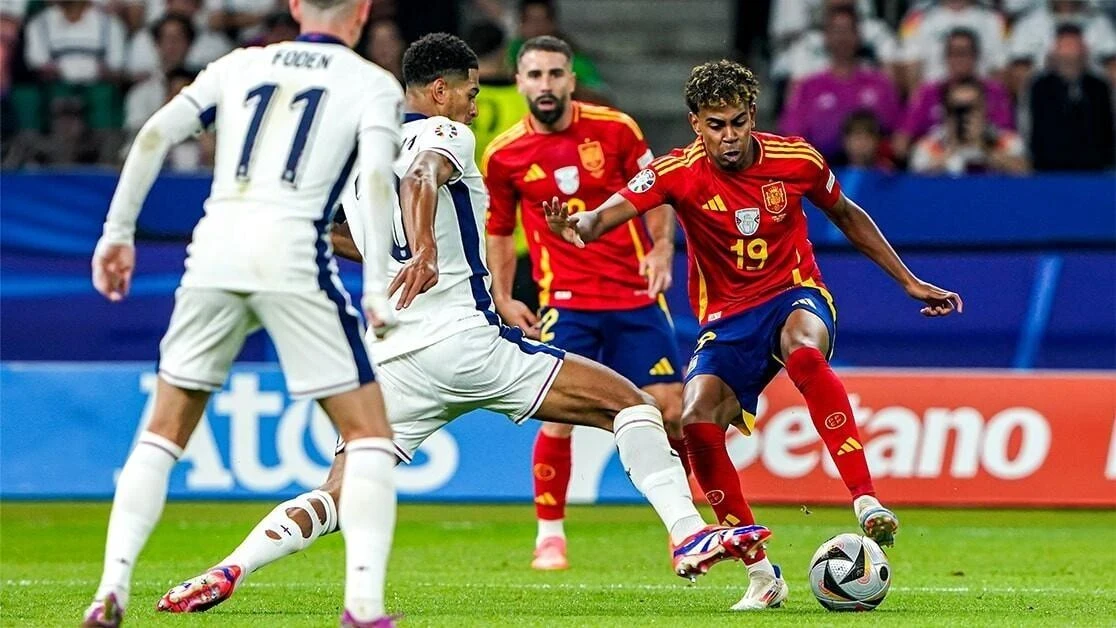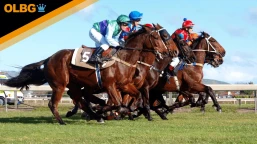
Your data guide to football betting, Dan Tracey shows you where the numbers point before the market catches up.
After the dust has settled on another gripping edition of UEFA’s European Championships in football, it’s time to not only reflect on the tournament's emotional highs and lows but also delve into the statistics that might reveal the secrets to success.
Decoding Success: What Drove Spain to Victory at Euro 2024?
Spain’s triumph in Euro 2024 urges us to examine the potential correlations between age, experience, and goals within the 26-man squads of the competing nations, posing questions about what truly contributes to glory on the continental stage.
To try and prove or disprove this, we are going to look at the 24 nations that competed in Euro 2024 and look at four primary factors:
- Caps Per Squad
- Average Caps Per Player
- Goals Per Squad
- Average Squad Age
(all metrics captured before the start of the tournament and not including actual tournament output)
In doing so, we will find out whether a younger squad helped Spain go all the way or whether experience helped La Roja win its first European Championship since 2012. At the same time, we will also look to see just how important goals are within a squad and who uses them best.
Caps Per Squad

As I see it, Croatia had the most experienced squad with 1,169 caps, yet didn't win Euro 2024. Spain, with just 552 caps, highlighted that youth might trump experience. Both finalists, England and Spain, were among the least experienced teams.
All Squads were of 26 players except for France and Belgium who decided to name a 25-man panel.
If we were to total up the number of caps that each international squad had won before the start of Euro 2024, the table would look as follows:
| Nationality | Caps | Rank |
|---|---|---|
| Croatia | 1169 | 1 |
| Portugal | 1130 | 2 |
| Switzerland | 1109 | 3 |
| Denmark | 1087 | 4 |
| Belgium | 965 | 5 |
| Germany | 906 | 6 |
| Serbia | 877 | 7 |
| Slovakia | 862 | 8 |
| Ukraine | 849 | 9 |
| Netherlands | 838 | 10 |
| France | 837 | 11 |
| Poland | 824 | 12 |
| Slovenia | 774 | 13 |
| Hungary | 752 | 14 |
| Georgia | 751 | 15 |
| Scotland | 745 | 16 |
| Albania | 669 | 17 |
| England | 651 | 18 |
| Austria | 648 | 19 |
| Turkey | 632 | 20 |
| Romania | 590 | 21 |
| Spain | 552 | 22 |
| Italy | 529 | 23 |
| Czech Republic | 422 | 24 |
As we can see the most experienced squad was Croatia with a total of 1169 caps within its 26 member panel, beating Portugal’s total of 1130 into second by a margin of 39 and Switzerland into third with 1109 – another 30 caps further back.
However, we both know that neither of these two nations won Euro 2024, so on a surface level we know that experience is not necessarily the be all and end all when it comes to putting a squad together.
If anything, you could argue that the opposite to this statement is true and although the Czech Republic have the least experienced squad with a total of 422 caps, it is Spain’s total of 552 which draws the most attention.
Luis de la Fuente’s men were the third-least experienced outfit in Germany with a total of 552 caps between the 26 players and this shows that the naivety of youth is perhaps more important than being a seasoned veteran.
To add further context to this, we can also see that England’s Three Lions group only had 651 caps between them before a ball was kicked in Germany – less than half that of Croatia’s most experienced squad.
Therefore, we now know that of the two finalists that contested the showpiece event in Berlin, England and Spain found themselves within the bottom seven nations when it came to overall experience. Not to forget, that then holders Italy were also the second least experienced squad.
Average Caps Per Player
| Nationality | Caps | Rank |
|---|---|---|
| Croatia | 44.96 | 1 |
| Portugal | 43.46 | 2 |
| Switzerland | 42.65 | 3 |
| Denmark | 41.81 | 4 |
| Belgium | 38.60 | 5 |
| Germany | 34.85 | 6 |
| Serbia | 33.73 | 7 |
| France | 33.48 | 8 |
| Slovakia | 33.15 | 9 |
| Ukraine | 32.65 | 10 |
| Netherlands | 32.23 | 11 |
| Poland | 31.69 | 12 |
| Slovenia | 29.77 | 13 |
| Hungary | 28.92 | 14 |
| Georgia | 28.88 | 15 |
| Scotland | 28.65 | 16 |
| Albania | 25.73 | 17 |
| England | 25.04 | 18 |
| Austria | 24.92 | 19 |
| Turkey | 24.31 | 20 |
| Romania | 22.69 | 21 |
| Spain | 21.23 | 22 |
| Italy | 20.35 | 23 |
| Czech Republic | 16.23 | 24 |
In theory, this second table should mask that of the first. In practice, there is a slight difference and that is because of France and Belgium’s decisions to name 25-man squads instead - a decision that ultimately backfired.
This means that France’s experience on an average caps per player moved up to eighth after being ranked 11th in the previous table and Belgium stayed in fifth place but found themselves an average of three caps per player behind Denmark in fourth.
Goals Per Squad

Considering total goals, Portugal, led by Cristiano Ronaldo’s 130 strikes, topped the chart with 226 goals. Despite this firepower, they didn't win. France (192 goals) and Belgium (180) also fell short, while champions Spain and finalists England had just 100 goals each, showing previous goals aren't everything for continental success.
| Nationality | Goals | Rank |
|---|---|---|
| Portugal | 226 | 1 |
| France | 192 | 2 |
| Belgium | 180 | 3 |
| Poland | 154 | 4 |
| Croatia | 149 | 5 |
| Netherlands | 141 | 6 |
| Denmark | 138 | 7 |
| Germany | 134 | 8 |
| Serbia | 132 | 9 |
| Switzerland | 126 | 10 |
| Ukraine | 114 | 11 |
| England | 100 | 12 |
| Spain | 100 | 13 |
| Austria | 96 | 14 |
| Czech Republic | 73 | 15 |
| Turkey | 71 | 16 |
| Slovenia | 70 | 17 |
| Scotland | 69 | 18 |
| Slovakia | 67 | 19 |
| Georgia | 64 | 20 |
| Romania | 63 | 21 |
| Hungary | 60 | 22 |
| Italy | 59 | 23 |
| Albania | 38 | 24 |
Another metric to look at is the number of total goals within a squad and with Portugal calling up Cristiano Ronaldo for their adventure in Germany, it comes as no surprise that the 2016 champions sit at the top of this particular chart.
Portugal come into the tournament with 226 goals within its personnel, 130 of them coming from the former Manchester United and Real Madrid icon and this would equate to 57.5% of all Portugal’s pre-tournament strikes.
Portugal at the top and interestingly the two nations that named 25-man squads found themselves second and third respectively. France with 192 goals within its squad before the tournament got underway, Belgium with a total of 180.
Of those three nations, France found themselves in the semi-finals and would lose Spain at the penultimate hurdle. When comparing the eventual champions own attacking output, they would find themselves with 100 goals.
The same number than that of follow finalists England and with these two nations being in the middle of the pack, it suggests that you did not need to take a squad brimming with previous goals to conquer the continent.
Average Squad Age
Examining age versus experience, Scotland's senior squad, averaging 28.31 years, was the oldest in the tournament but exited early. Germany, slightly younger at 28.15, also fell short, while Spain at 27.00 and England at 26.08 thrived with younger, dynamic squads
| Nationality | Age | Rank |
|---|---|---|
| Scotland | 28.31 | 1 |
| Germany | 28.15 | 2 |
| Poland | 27.81 | 3 |
| Croatia | 27.69 | 4 |
| Hungary | 27.42 | 5 |
| Serbia | 27.38 | 6 |
| Slovenia | 27.31 | 7 |
| Albania | 27.31 | 8 |
| Slovakia | 27.27 | 9 |
| Georgia | 27.15 | 10 |
| Portugal | 27.00 | 11 |
| Spain | 27.00 | 12 |
| Romania | 27.00 | 13 |
| Switzerland | 26.92 | 14 |
| France | 26.92 | 15 |
| Belgium | 26.88 | 16 |
| Austria | 26.81 | 17 |
| Netherlands | 26.58 | 18 |
| Denmark | 26.54 | 19 |
| Italy | 26.50 | 20 |
| Ukraine | 26.35 | 21 |
| England | 26.08 | 22 |
| Turkey | 25.85 | 23 |
| Czech Republic | 25.31 | 24 |
Another metric is the age old argument of age over experience. How important is it to have a senior squad and how important is it to have fearless youngsters who are ready to excel at the highest stage possible?
If we consider experience to be at the top of the rank and youth at the bottom, we can see that experience did Scotland no favours whatsoever. Steve Clarke’s men were the oldest in Germany at an average age of 28.31, they also were dumped out in the group stage.
Their heaviest defeat was at the hands of hosts Germany and with Julian Nagelsmann’s men earning a resounding 5-1 win over Scotland in the tournament opener, they also did so with the second oldest squad.
An average of 28.15 is just a shade younger than Scotland, but they were more than a shade better than the Tartan Army a few weeks ago. Unfortunately for Germany, their own party would end abruptly at the quarter final stage.
Defeat to Spain and with an average of 27.00, the 2024 winners found themselves in the middle of the pack (a similar situation to their goalscoring output), whereas fellow finalists England arrived in Germany with the third youngest squad of the lot.
At 26.08, the Three Lions were only older than both Turkey and the Czech Republic and when you look at the relative youth of this England squad, it does make you wonder how now former manager Gareth Southgate could not quite get the best out of such talented personnel.
Tournament Rankings
Tournament Rankings
Now that we have mapped out four key metrics, we need to also map out the most important metric of all – tournament rankings.
To do this, each of the 24 nations is assigned an overall ranking between 1 and 24.
For example:
Spain are ranked 1, England are ranked 2 by virtue of finishing as winner and runner up of Euro 2024.
Where two or more nations exited at the same stage, their overall record in the tournament serves as the tiebreaker. Therefore, semi-finalists the Netherlands and France are ranked 3 and 4 respectively.
With that in mind, here are the Euro 2024 overall rankings:
| Nation | Tournament Rank |
|---|---|
| Spain | 1 |
| England | 2 |
| Netherlands | 3 |
| France | 4 |
| Germany | 5 |
| Switzerland | 6 |
| Turkey | 7 |
| Portugal | 8 |
| Austria | 9 |
| Belgium | 10 |
| Slovenia | 11 |
| Slovakia | 12 |
| Romania | 13 |
| Italy | 14 |
| Denmark | 15 |
| Georgia | 16 |
| Hungary | 17 |
| Croatia | 18 |
| Ukraine | 19 |
| Serbia | 20 |
| Albania | 21 |
| Czech Republic | 22 |
| Poland | 23 |
| Scotland | 24 |
As we can see Spain finish top of the pile, while Scotland finished last by virtue of having the worst group stage record of all the nations that finished bottom of the six groups. A definitive list perhaps but one lacking context at the same time.
Correlations
However, we can now apply context by comparing this ranking list to each of the other ranking lists above and see where the strongest correlations between performance and metrics lied:
| Nation | Tournament Rank | Caps Rank | Average Caps | Goals Rank | Age Rank |
|---|---|---|---|---|---|
| Spain | 1 | 22 | 22 | 13 | 12 |
| England | 2 | 18 | 18 | 12 | 22 |
| Netherlands | 3 | 10 | 11 | 6 | 18 |
| France | 4 | 11 | 8 | 2 | 15 |
| Germany | 5 | 6 | 6 | 8 | 2 |
| Switzerland | 6 | 3 | 3 | 10 | 14 |
| Turkey | 7 | 20 | 20 | 16 | 23 |
| Portugal | 8 | 2 | 2 | 1 | 11 |
| Austria | 9 | 19 | 19 | 14 | 17 |
| Belgium | 10 | 5 | 5 | 3 | 16 |
| Slovenia | 11 | 13 | 13 | 17 | 7 |
| Slovakia | 12 | 8 | 9 | 19 | 9 |
| Romania | 13 | 21 | 21 | 21 | 13 |
| Italy | 14 | 23 | 23 | 23 | 20 |
| Denmark | 15 | 4 | 4 | 7 | 19 |
| Georgia | 16 | 15 | 15 | 20 | 10 |
| Hungary | 17 | 14 | 14 | 22 | 5 |
| Croatia | 18 | 1 | 1 | 5 | 4 |
| Ukraine | 19 | 9 | 10 | 11 | 21 |
| Serbia | 20 | 7 | 7 | 9 | 6 |
| Albania | 21 | 17 | 17 | 24 | 8 |
| Czech Republic | 22 | 24 | 24 | 15 | 24 |
| Poland | 23 | 12 | 12 | 4 | 3 |
| Scotland | 24 | 16 | 16 | 18 | 1 |
| CORRELATION | 0.046 | 0.065 | 0.291 | -0.330 |
- Tournament Ranking vs Caps Rank: 0.046
- Tournament Ranking vs Average Caps Rank: 0.065
- Tournament Ranking vs Total Goals Rank: 0.291
- Tournament Ranking vs Average Age Rank: -0.330
If 1 is considered the strongest positive correlation and -1 the strongest negative correlation, we can see there was very little correlation between tournament ranking and caps earned (either total or on an average basis).
At less than 0.1, there was an element of positive correlation but nowhere near enough to make any real difference to a nation’s performance at Euro 2024. However, there was slightly more of a correlation when it came to scoring goals and success in Germany.
Here the correlation between the final tournament ranking and total goals rank was at 0.291, suggesting that goalscoring ability is required to a greater degree than caps within the squad. A statement that stands to reason when you consider if you do not score, you cannot win.
However, there was no positive correlation regarding performance and the average age of the squad. There was a greater negative correlation between these two factors, than there was a positive one between performance and total goals.
A positive swing of 0.291 when comparing ranking vs total goals, a negative swing of 0.330 when comparing ranking vs average age. Which means to win a tournament you do not need experience, you do not even need a great number of goals or experience, you just need to be the best on the day.



